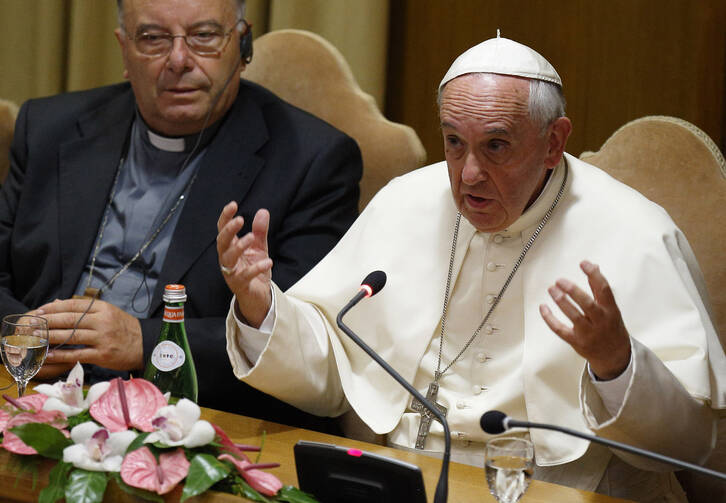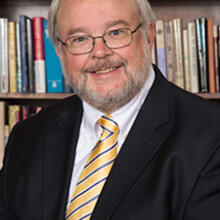Perhaps you've heard, Pope Francis is coming to Washington. Some people have been talking about this for months. Pope John Paul II visited Washington in 1979 and Pope Benedict XVI in 2008, but this trip is different.
Pope Francis has never set foot in the United States. Washington thinks it is the center of the world, but it is not the center of Pope Francis’ world. He prefers to serve in slums, rather than in corridors of power. He seeks out the poor and vulnerable, not the rich and powerful. As we watch him come to our land, he will also see us for the first time. I hope that we will be moved by his simple ways and powerful words and that he will be encouraged by the diversity and vitality of our church and nation.
Francis will be the first pope to address a joint meeting of Congress. This represents a transformation in American attitudes toward the papacy. Only 55 years ago, Rev. Billy Graham, Dr. Norman Vincent Peale, Rev. Martin Luther King, Sr., President Harry Truman and others said John Kennedy should not be President because he would take advice from the Pope. Now it seems the only thing Congress agrees on is they need advice from this pope.
A bipolar Washington, both excited and anxious, awaits Pope Francis. There is great anticipation. One of the hardest decisions for members of Congress is who will get their one place in the gallery when the Pope speaks. Congress with 73 percent disapproval wants to be seen with a leader whose unfavorable rating is 16 percent among Americans.
Pope Francis comes to speak to a Congress that is dysfunctional and demoralized. They cannot pass budgets or appropriations on time. Congress cannot reform immigration or repair the Voting Rights Act. The nation fights a war against ISIS without congressional debate or authorization. In a city of constant partisan combat, Francis will once again call for “politicians capable of sincere and effective dialogue" ("Evangelii Gaudium," No. 205).
Capitol Hill is “demoralized” in deeper ways. It lacks moral direction, serving powerful interests rather than the common good. This August, many Republicans have been traumatized by Trump and his demonization of immigrants, threats against “stupid leaders” and “losers” who stand in his way and crude attacks on women who dare to question him. The Republican House will not even vote on immigration reform and denies the damage we are doing to God’s creation. They would repeal health care for the uninsured and cut help for hungry families as part of their ideological agenda. Francis has acknowledged that in his defense of the poor, he should not forget the middle class. Washington could learn from him to move beyond dependence on campaign contributions from the rich and a constant focus on the middle class to not forget the poor.
Many Democrats defend Planned Parenthood, dismissing horrific evidence that reveals more clearly than ever the humanity of the unborn child, the brutal violence of abortion and the dehumanizing attitudes of the abortion industry. Planned Parenthood is the N.R.A. of the progressive movement, demanding support or silence no matter what it says or does. I don’t recall liberals saying Romney’s 47 percent comment should be ignored because of how it was obtained or edited. Pope Francis is likely to repeat his admonition, “It is not ‘progressive’ to try to resolve problems by eliminating a human life” ("Evangelli Gaudium," No. 214).
Pope Francis may be new to the United States, but his message will not be new. He warned the European Parliament against a “throwaway culture” and urged protection for unborn children and welcome for immigrants. In the Philippines he urged that “the poor be treated fairly—their dignity be respected, that political and economic policies be just and inclusive.” In Latin America he said,“certainly every country needs economic growth and the creation of wealth, but creation of this wealth must always be at the service of the common good, and not only for the benefit of a few." Everywhere, he calls for respect for family life, defense of religious freedom and care for God’s creation. In Washington, Pope Francis will affirm our founding principles, applaud our diversity and deliver a message of responsibility, the opportunity and obligation to use our freedom, power and resources to build a nation and world of greater justice, solidarity and peace.
Francis will teach and touch us by what he does, as much as by what he says. He will come to Washington through Havana, reinforcing his call for dialogue over confrontation. He will go from meeting the most powerful in Washington to spend time with the least, those who are hungry, homeless or new to our nation. He will meet with bishops and I hope listen to survivors of clerical sexual abuse. After addressing the United Nations, he will visit an inner city Catholic school in Harlem. He will celebrate Mass with a million people and then bring a word of hope to prisoners as he ends his journey.
If Congress wants to truly welcome Francis, they should follow his example and Walk with Francis. Not only might their polls improve, but they might come to practice discover “civic and political love” which Francis describes in these simple words:
“We must regain the conviction that we need one another, that we have a shared responsibility for others and the world, and that being good and decent are worth it” ("Evangelii Gaudium," No. 229).








